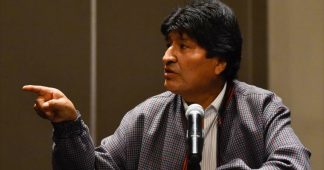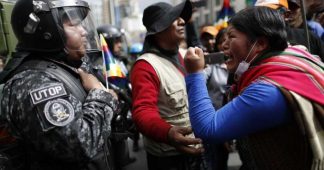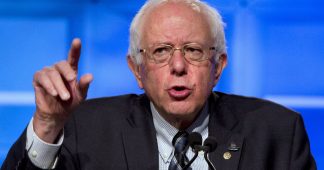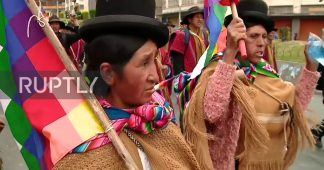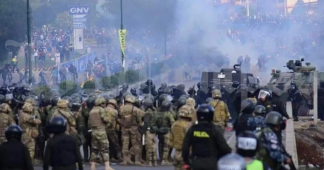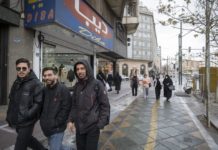Why are Evo Morales and the MAS Negotiating with the Leaders of the Coup?
While the far-right tries to consolidate the coup in Bolivia, the working, indigenous, and peasant people are fighting back. Meanwhile, Morales and his party, the MAS, have opened negotiations with the coup leaders.
By
November 20, 2019
A right-wing coup has occurred in Bolivia.
The army, the police, large agribusiness interests, and the Catholic Church capitalized on perceived electoral irregularities to overthrow President Evo Morales with the support of U.S. imperialism. After Morales’s forced resignation, the racist, ultra-conservative right linked to the church took power. The police cut indigenous symbols from their uniforms and stood by as right-wing protesters burned the indigenous flag, the “wiphala.” Right-wing Congresswoman Jeanine Áñez proclaimed herself president in a half-empty Congress without quorum and emerged with a massive leather-bound Bible in hand. “The Bible has returned to the Presidential Palace,” she declared.
But Bolivian workers and indigenous people are defying the coup. The streets of El Alto, Cochabamba, and La Paz are shaking under the weight of tens of thousands of Bolivians hoisting the wiphala, ready to confront the Right. They are holding assemblies, forming self-defense committees, and organizing massive protests. Miners and coca-pickers have also joined the rebellion. Clarín, a mainstream Argentine newspaper, has likened the assemblies of 15–20 people to “Lenin or Trotsky’s soviets.” While this is certainly an exaggeration, it points to the potential of these bodies of self-organization. “This is civil war,” the protesters chant, as they face off against the police in the streets, putting their bodies on the line against a right-wing coup that they know will mean violence, austerity, and the curtailment of democratic rights. Twenty-three people have already been killed by the police and military repression, but this has not deterred protestors.
These councils have shown themselves much more willing to fight than Morales and his party, the MAS (Movimiento al Socialismo, or Movement for Socialism). They are taking a different road, attempting to negotiate with the Right while refusing to support the people in the streets.
How Morales and the MAS Face the Coup
After the coup, Morales fled Bolivia, accepting political asylum in Mexico. As socialists in Bolivia wrote in La Izquierda Diario, “The decision of Evo Morales to travel at this moment implies, objectively, [a] weakening [of the] resistance to the coup.”
Jaime, a protester of Aymara descent who supports Morales, said, “Evo left for security reasons. But he should be here. He shouldn’t abandon us. He should be here and call for new elections…The people will protect him.”
Morales has abandoned the tens of thousands of indigenous people who are fighting and even dying in the face of a right-wing coup. What’s more, he has refused to voice support for the protests. Morales has implicitly spoken against the uprising in El Alto, tweeting, “I ask my people with great care to respect the peace and not fall into the violence of groups that seek to destroy the rule of law. We cannot fight among our Bolivian brothers and sisters. I make an urgent call to resolve all differences with dialogue and discussion.” From Mexico, Morales threw his full support behind a possible “national dialogue” and expressed his willingness to return to Bolivia if that would help pacify the country. He said, “If my presence can help stop the violence and protect life, I will do it for my dear Bolivia.”
Meanwhile, Áñez and the coup leaders issued a decree legalizing the use of firearms to suppress protests and giving the armed forces free reign to suppress the rebellion in El Alto. Journalists from other Latin American countries and 700 Cuban doctors have been expelled from the country. In fact, the minister of government, Arturo Murillo, declared that he would “hunt” any seditious elements that oppose the new regime.
Today, the MAS still represents an absolute majority in Congress, but it has shown itself willing to accept the coup against Morales. Sergio Choque, a MAS representative from El Alto, stated that to achieve peace, the party intends to begin negotiations with the leaders of the coup. Echoing this, MAS senator Omar Aguilar declared in a radio interview, “Our objective is to bring peace to the country, not to obstruct the transitional government led by Jeanine Áñez.”
On Friday, MAS members met with the ultra-right-wing coup leaders, including a government minister appointed by the coup. The meeting also included an EU ambassador in Bolivia who has recognized not only the coup government. Though no agreement has been reached yet, the negotiations dealt with Morales’s return to the country, the process for new elections, and an agreement to end both police repression and the popular mobilizations. While MAS officials cooperate with the opposition, Áñez is attempting to keep not just Morales, but his entire party from taking part in the upcoming elections.
The MAS continues to act as though the unelected coup government is a valid political entity and negotiating partner. With this strategy, the MAS is attempting to use the growing mobilization and resistance against the coup, not to confront and defeat the right, but to negotiate the eventual participation of the MAS in a future electoral process. Even if they were able to secure the MAS’s participation, however, Áñez and the leaders of the coup, Luis Fernando Camacho and Carlos Mesa, will do everything they can to ensure that Morales will not be a candidate.The consequence of the MAS’s policy toward of the new (illegitimate) government has been and emboldened Right and increased attacks on workers, peasants, and the people resisting in the streets.
There is no negotiating with fascist religious fanatics who are dedicated to brutally oppressing working-class and indigenous people. Making agreements with the leaders of this the vicious right-wing coup only legitimizes their existence. They can only be fought through working class and indigenous mobilizations. This is the task facing Bolivia right now, one that the MAS and Morales have positioned themselves against.
How Did Bolivia Get Here?
Morales was part of a wave of progressive politicians who took office in Latin America, a phenomenon that came to be known as the Pink Tide. Although seemingly on the side of working-class people, these leaders gave only small concessions to workers while overseeing the massive expansion of capitalist profits during an economic boom across Latin America. When economic crisis hit Latin America, however, they made sure the working class paid for it.
However, even this was not enough for the capitalists who supported an institutional coup against Dilma Rousseff in Brazil and the imprisonment of former President Lula da Silva. In moments of economic crisis the Latin American capitalists want deeper and more austerity, dismissing the Pink Tiders via elections or in the case of Brazil and Bolivia, through coups.
The MAS took over the government of Bolivia in 2006, after the revolts that led to the fall of the neoliberal government of Gonzalo Sánchez de Lozada. In 2003, Lozada was forced to resign after the so-called Gas War, which erupted over a policy of exporting unprocessed gas resources through Chile to the United States. It was characterized by massive independent struggle of the working, peasant, and indigenous people, in which the population of El Alto played a key role and suffered the militarization of the territory and a brutal repression that went down in history as the October Massacre. 71 protesters were killed and hundreds more wounded. The mobilized people mainly demanded the nationalization of hydrocarbons and called for a constituent assembly. These demands, among others, formed the so-called October Agenda.
After the ousting of Lozada by mass mobilizations of the people, then Vice President Carlos Mesa took control of the presidency for about a year. In 2005 he was defeated by Morales and his promise to fulfill the October Agenda. In this year’s election, Mesa ran against Morales; after Morales’s victory, he played an instrumental role in the coup.
To defeat Mesa in the October 2019 election, Morales and the political regime effectively co-opted the process opened by the Gas War, redirecting Bolivians’ mistrust of the Lozada regime. While the Gas War mobilizations sought to impose the October Agenda with mobilizations in the streets and in the workplaces, Morales’ victory brought the focus of those struggles to the Parliament and provided illusions in the state.
Morales’ government was strengthened by the cycle of economic growth that Latin America experienced from the early 2000s until the international crisis of 2008. This growth allowed Morales to provide some concessions to the working class. Sectors of the previously anti-government indigenous movements were integrated into the MAS, taking up elected positions. Their participation both fostered illusions in Morales and bureaucratically repressed struggle. Additionally, under Morales, a new bourgeois sector emerged that was linked to gas production, mining, and state administration and that was unwaveringly loyal to Morales.
Nevertheless, Morales’ limited opposition to the historically racist agrarian bourgeoisie brought about several conflicts, including other coup attempts. In 2008, for example, the bourgeoisie of Santa Cruz rose up against Morales with the support of the middle classes that had grown to oppose the growing bureaucratization of the MAS regime. Morales avoided the coup by both guaranteeing land to large landowners and conceding some limited land redistribution for peasants and indigenous people.
On the other hand, the state under Morales became increasingly bureaucratized and undemocratic. Unions increasingly became integrated into the MAS, allowing the government to discipline the most combative unions and social movements. This included the persecution of anyone in the union who opposed the MAS. Morales also repressed democratic rights, such as the right to protest—most notably attacking disabled activists, as well as miners, the student movement, and the indigenous movement.
Morales increasingly implemented policies that hurt his indigenous and working-class base. For example, as part of its agreements with the agrarian bourgeoisie, the MAS advanced on the exploitation of the Tipnis river area, home to many indigenous people. As a product of this policy, important sectors of the indigenous movement broke with the MAS.
At the same time, he opened the way for the right wing by working alongside the church and insurgent right wing politicians. As Violeta Tamayo, a revolutionary socialist in Bolivia writes, “Far from socialism, Evo Morales encouraged capitalist profits and strengthened the right and the businesses who for years have been great friends of Evo. He attacked and violated the self-determination of the indigenous people, as well as attacking the student movement. I have been arrested three times under the MAS government for mobilizing.” In short, Morales domesticated the labor movement and the indigenous movement through repression and co-optation while allowing the growth of the Right.
Morales’s tendencies toward authoritarianism and left-Bonapartism were exacerbated when, after his second term in 2016, Morales promoted a referendum to carry out a legislative reform that would allow him to run for office. Although he was defeated in the referendum, Morales ignored it and ran once again. This move, combined with the accusations of electoral fraud in Bolivia’s most recent elections made it easy for the right wing to capitalize on the discontent of the middle classes and some sectors of workers.
Ultimately, the current coup against Morales has succeeded where the 2008 coup could not because of the economic crisis that hit Latin America in recent years, resulting in an earthquake for all the Pink Tide governments. This same crisis brought about an institutional coup and the rise of the ultra right in Brazil, as well as right-wing presidencies in Chile and Argentina.
When economic crisis hit Latin America, the Pink Tide governments, including Morales, made sure the working class paid for it. But in moments of economic crisis the Latin American capitalists want deeper and more austerity, dismissing the Pink Tiders via elections or, in the case of Brazil and Bolivia, through coups. In Bolivia, the overthrow of Morales was orchestrated by the ultra right, which has always opposed Morales and which was emboldened by the economic crisis as well as by increased government authoritarianism.
What Is the Alternative?
There is a way to fight the coup. Every day, the indigenous workers from El Alto and cities all over the country show that there is a will to fight against the right wing.
They are fighting for their very survival. They are fighting the hate crimes that an emboldened right will produce, as well as the brutality of a police force under the command of an anti-indigenous, hyperreligious fanatic.
But their struggle shows something else as well: independent bodies of workers and indigenous people, organized in community police and self-defense committees, can defeat the army’s repression. They do not need Congress—they can convene democratic assemblies. They do not need the capitalists or their government—when the working class stops, everything stops.
This is why Morales and the MAS are unwilling to support the masses fighting in El Alto. If the masses can end a coup, why would they settle for the measures that Morales and the MAS would certainly institute in the leadership? During their time in power, Morales and the MAS have shown that they want to maintain capitalist profits; as a result, it is better to negotiate with the right wing rather than support a victory of the working class and the indigenous movement.
As socialists, we need to be clear about which side we are on. We are against the right-wing coup by agribusiness, the church, and foreign imperialism. We believe that the coup-plotters can and should be ousted. But we also see clearly that the MAS is not trying to stop the coup. They are trying to maintain capitalist peace in Bolivia and maintain positions in Congress so that Morales can return and win the election—either now or in a few years.
We are on the side of the indigenous workers fighting heroically in El Alto, on the side of the people who are putting their bodies on the line to fight the right-wing coup—people whose struggle deserves our unwavering support. But as the mass mobilizations in Chile demonstrate, it is not enough to have large protests.
To defeat the government there needs to be an alliance between social movements and the labor movement—together they must shut down all industry and call a general strike until the coup government falls. This would mean building a united front of all workers, indigenous, and youth organizations to put a wrench in the capitalists’ profits and expanding the organs of self-organization and self-defense to a national level. There can be no negotiation with the fraudulent coup government.
The limits of the MAS and Morales are perhaps more evident now than they have ever been. He is very clearly not on the side of the heroic people fighting in the streets this very moment. Consequently, the movement should not be content with simply bringing Morales back.
For the Victory of the Workers and the People of Bolivia
We must stand in solidarity with the heroic struggle of the Bolivian people reject attempts at negotiation with the coup plotters. The example of El Alto and the working, indigenous, and peasant masses must continue to deepen in order to retake the October Agenda, defeat the coup, and set up a constituent, free, and sovereign assembly that puts an end to the capitalist oppression of the Bolivian people. The role of the working class in alliance with all oppressed sectors is indispensable in the fight to defeat the exploiters.
Published at https://www.leftvoice.org/why-are-evo-morales-and-the-mas-negotiating-with-the-leaders-of-the-coup

